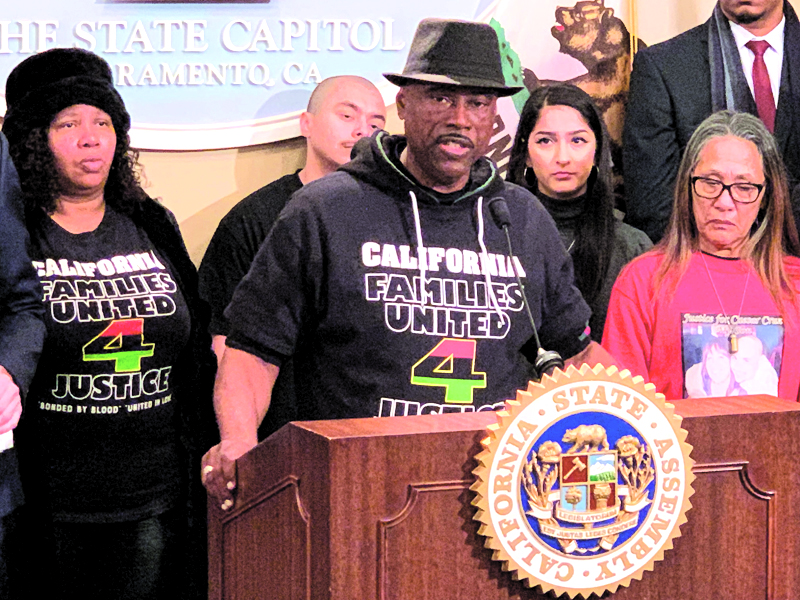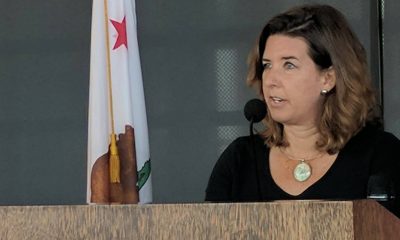Berkeley
Bill Restricting Police Use of Force Passes Senate Committee

The California Assembly overwhelmingly passed legislation to change rules governing when cops in the state can use lethal force, despite last-minute opposition from some families of victims of police shootings who said compromises in the bill’s language watered down the legislation.
Assembly Bill 392: The California Act to Save Lives changes the use-of-force standard for police in the state to when “necessary” as opposed to when deemed “reasonable,” The L.A. Times reported on May 30.
However, in a concession to police groups, a definition of “necessary” was removed from the bill’s final language, and language was added indicating that a police officer’s use of force would be “evaluated” “based on the totality of the circumstances,” the Sacramento Bee explains.
The changes had some members of families of police shootings pulling their support for the bill.
“Another person is going to have to die before we can prove that this bill is not going to do what you think it’s going to do,” Laurie Valdez, whose partner, Antonio Guzman Lopez, was shot by San Jose State police in 2014, told the Times. “It’s like a slap in our face.”
But other families, supporters and sponsors of the bill written by state Assemblywoman Shirley Weber (D-San Diego), an African American lawmaker who said she was inspired in part by wanting to keep her grandsons safe, said it would go a long way toward needed change in the training and behavior of police officers.
As the Times notes:
Cephus Johnson, uncle of Oscar Grant, who was shot by a Bay Area Rapid Transit officer in Oakland in 2009, said there are five organizations still co-sponsoring the bill that work directly with families of victims, representing “hundreds” of supporters.
Stevante Clark, a member of Johnson’s group whose brother, Stephon Clark, became a rallying point for the legislation after he was killed by Sacramento police in 2018, said the bill was “a little watered-down with the changes that were made, but at the same time this is progress.”
“Slow progress is better than no progress,” Clark said.
In a written statement to The Root, the American Civil Liberties Union of Northern California also praised the bill saying:
Changing the use of force standard in California will change the way officers are trained to pursue other, non-deadly, resources or techniques when engaging with the public. …
For far too long, California has ignored the problem of police shootings, and the disproportionate killings of black and Latino Californians and people with disabilities. AB 392 finally addresses this problem head on – with solutions we know work.
Weber told the Times that as an assemblywoman, she expected compromise would be needed before passage of the bill, but said the legislation remained strong.
“I kept saying this bill will make it safe behind and in front of the badge,” said Weber, adding that the legislation will allow her grandsons to grow up with as many rights as any other children.
“They believe at this point that they have just as much right and respect as any other child in this nation, and that should never change,” she said.
Other Bills to watch:
AB 5 – Worker Status: Employees and Freelancers
The state Assembly voted 59-15 to pass AB 5 on May 29. If signed by Gov. Gavin Newsom, the legislation will make it tougher for companies to enter contracts with freelancers and could affect hundreds of thousands of “gig economy” workers across the state, including nail technicians, Uber drivers, Amazon delivery workers and even exotic dancers. Assemblymember Lorena Gonzalez (D-San Diego) introduced the legislation, also known as the “Dynamex Bill” or the “Employee Misclassification bill.”
By writing into law specific rules and penalties, AB 5 builds on a California Supreme Court 2018 decision that instructed business to apply an “ABC” test to determine whether a worker is a freelancer or employee.
For a worker to be classified as a freelancer, employees would have to prove that the worker is (A) not under the contracting company’s control, (B) is doing work that is not central to the company’s business, and (C) has an independent business providing a service.
If workers don’t meet those requirements, companies would have to provide all the required pay and benefits under California law like overtime pay, minimum wage, workers compensation, employee insurance, paid parental leave and healthcare subsidies. The bill has now moved to the Senate for review.
AB 1482 – Rent Cap
A statewide rent cap bill passed in the Assembly a 43-28 vote on May 29. Introduced by Assemblymember David Chiu (D-San Francisco), the bill prohibits landlords from raising rents above 7 percent per year, plus annual cost-of-living increases. Selling the legislation to his colleagues in the Assembly, Chiu talked about the high cost of living in California and urged legislators to take action to protect people who are often a rent hike away from eviction. “They are our neighbors,” he said. “They are our co-workers. They are our brothers and sisters. They are our grandparents.” Since introducing the bill, Chiu has made several changes to it in negotiations with landlord and realtor groups to gain their support. The rent cap, which sets itself to expire in 2023, covers single-family homes and condos – even in areas with existing local rent control laws. It exempts landlords with no more than 10 single-family homes and properties that are under 10 years old. AB 1482 is expected to undergo more amendments in the Senate.
Arts and Culture
Farwest Region Deltas Celebrate Centennial With “September Breakfast” Honoring Vivian Osborne Marsh
The region was established in 1925 under the leadership of Vivian Osborne Marsh, who became its first Regional Director. Marsh was a pioneering scholar and civic leader, earning recognition as the first Black woman to receive both a bachelor’s and a master’s degree in anthropology from UC Berkeley.

By Antoinette Porter
Hundreds of members of Delta Sigma Theta Sorority, Inc., and their guests gathered at the Martin Luther King Jr. Student Union at the University of California, Berkeley, to mark the 100th anniversary of the sorority’s Farwest Region.
The region was established in 1925 under the leadership of Vivian Osborne Marsh, who became its first Regional Director. Marsh was a pioneering scholar and civic leader, earning recognition as the first Black woman to receive both a bachelor’s and a master’s degree in anthropology from UC Berkeley.
Marsh went on to serve as Delta Sigma Theta’s 7th National President, where she launched the sorority’s National Library Project to expand access to books in underserved Black communities in the South. During her presidency, the organization also became a prominent voice in the civil rights movement, lobbying Congress to pass anti-lynching legislation.
Bak in the Bay Area, Marsh devoted her career to advancing educational opportunities, mentoring young people, and strengthening community life. That commitment continues to shape the region, which supports initiatives in education, social justice, and economic development. Current projects include raising scholarship funds for students at Historically Black Colleges and Universities, voter education campaigns, and health and wellness programs.
A century after its founding, the Farwest Region of Delta Sigma Theta remains active across California and other western states, carrying forward Marsh’s vision of service and advocacy.
Arts and Culture
Cal Performances Presents Angélique Kidjo & Yo-Yo Ma in Sarabande Africaine at UC Berkeley Greek Theatre on Aug. 30
On Saturday, Aug. 30, the pair will debut the Bay Area premiere of Sarabande Africaine, joined by pianist Thierry Vaton, percussionist David Donatien, and special guest Sinkane. The program illuminates centuries of musical interplay between African traditions and Western classical forms, using the Baroque sarabande dance, and its African ancestor, the Congolese spirit dance Zarabanda, as a gateway to exploring the deep, interconnected roots of global music.

By Carla Thomas
On Labor Day weekend two of the world’s most celebrated musicians and cultural ambassadors, Grammy Award–winning vocalist Angélique Kidjo and legendary cellist Yo-Yo Ma join forces for an evening of music, history, and cultural dialogue at UC Berkeley’s historic Hearst Greek Theatre.
On Saturday, Aug. 30, the pair will debut the Bay Area premiere of Sarabande Africaine, joined by pianist Thierry Vaton, percussionist David Donatien, and special guest Sinkane. The program illuminates centuries of musical interplay between African traditions and Western classical forms, using the Baroque sarabande dance, and its African ancestor, the Congolese spirit dance Zarabanda, as a gateway to exploring the deep, interconnected roots of global music.
Both Kidjo and Ma have built careers not only as great performers but as passionate advocates for cultural understanding. Sarabande Africaine is as much a conversation about shared heritage as it is a musical performance, blending genres, geographies, and histories.
“Every day there are moments when all of us can feel we are on the inside of something and also when we feel we are on the outside of something,” said Yo-Yo Ma. “To be able to understand both at the same time and oscillate between the two gives us a larger perspective on the world.”
“If your mind is open, and there is no fear, it’s easier to listen, and to question yourself,” said Kidjo.
The upcoming performance is presented within Cal Performances’ Illuminations: “Exile & Sanctuary” series for the 2025–26 season. The production explores exile as more than just physical displacement, but a disruption in identity and belonging, while sanctuary represents both refuge and the creative space where new connections and communities can take shape.
Cal Performances’ Illuminations bridges performances with UC Berkeley’s academic research, pairing the arts with conversations about urgent global issues.
Kidjo’s continued partnership with Cal Performances includes her 2021–22 artist-in-residence, premiering her music-theater work Yemandja, set in 19th-century West Africa during the transatlantic slave trade.
She also participated in the Bias in Our Algorithms and Society panel alongside campus leaders like Jennifer Chayes, and joined the Black Studies Collaboratory for a dialogue on music, diaspora, and the world.
She has since returned to Berkeley for multiple performances, most recently in 2024 at Zellerbach Hall.
Yo-Yo Ma’s history with Cal Performances spans decades, beginning in 1997. One notable project includes the 2018 performance of Bach’s complete cello suites at the Greek Theatre, a testament to his devotion to creating “transformative concert experiences in iconic spaces.”
For tickets and more information, visit calperformances.org.
Activism
The Case Against Probate: False Ruling Invalidates Black Professor’s Estate Plan, Ignoring 28-Year Relationship
Zakiya Folami Jendayi, beneficiary of Head’s estate, states that “The errors, ranging from misstatements of fact, omissions of critical evidence, and reliance on false arguments and testimony, formed the basis of Judge Sandra K. Bean’s ruling against me, Dr. Head’s previous student, mentee, sorority sister and long-time friend,and despite the fact that I was her chosen, power of attorney, Advanced Healthcare Directive agent, trustee, executor and sole beneficiary.”

By Tanya Dennis
Part 5
In a shocking miscarriage of justice, a California probate judge issued a Statement of Decision on March 28 riddled with numerous documented errors that invalidated the estate plan of esteemed Black Studies professor Dr. Laura Dean Head.
The ruling from the Alameda County Superior Court’s probate division in Berkeley has sparked outrage from advocates for probate reform, community members and civil rights activists, who say the decision reflects deep flaws in the probate system, blatant disregard for due process, and the wishes of the ancestors. Judge Sandra Bean’s ruling reflects a repeated outcome seen in Black and Brown communities.
Zakiya Folami Jendayi, beneficiary of Head’s estate, states that “The errors, ranging from misstatements of fact, omissions of critical evidence, and reliance on false arguments and testimony, formed the basis of Judge Sandra K. Bean’s ruling against me, Dr. Head’s previous student, mentee, sorority sister and long-time friend,and despite the fact that I was her chosen, power of attorney, Advanced Healthcare Directive agent, trustee, executor and sole beneficiary.”
Reading court transcripts, the most egregious violations according to Jendayi reveal a pivotal point in the ruling that rested on a letter from Dr. Stephan Sarafian of Kaiser Permanente, who misidentified Dr. Head as male, misstated the day, month, and year, and asserted Head lacked capacity.
Under cross-examination, he reversed his opinion and admitted under oath that he never conducted a mental evaluation, did not diagnose Dr. Head with incapacity, did not write the letter, and stated he merely signed it “in case it was needed in the future.”
Despite Sarafian’s perjury, on Oct. 17, 2024, the California Court of Appeal upheld the lower court decision that relied on Sarafian’s discredited letter to invalidate Dr. Head’s estate plan, ignored Jendayi’s requests to impeach his testimony and dismiss Sarafian’s testimony and letter that both the Kaiser Grievance Department and the Medical Board of California denounced.
In her ruling, Judge Bean agreed with the false argument by attorney Leahy, which alleged that Jendayi provided the names of the beneficiaries to Head’s estate attorney, Elaine Lee. Bean made this decision despite Lee’s sworn testimony that Dr. Head had met with her alone, behind closed doors, and made the independent decision to leave her estate to Jendayi.
According to court records, Judge Bean reversed the burden of proof in the undue influence claim before any of Jendayi’s witnesses testified, forcing Jendayi to disprove allegations that were never substantiated by witnesses or records.
Bean ruled: “Respondent took Dr. Head to her apartment where she assumed complete control of Dr. Head’s day-to-day care, medical care, and all aspects of her life.” Jendayi proved that statement was false.
Bean also ruled that Respondent controlled Dr. Head’s necessities of life, food, and hospice care, despite zero testimony or documentation supporting any of those claims.
The court reduced Jendayi’s role to “a friend who, at best, cared for Dr. Head during the final two months,” totally ignoring 28 years of friendship, testimony, evidence, letters of recommendation, emails, and medical records.
Exhibits confirming Dr. Head’s intent and capacity, including the discredited medical letter, Exhibit 90, were omitted or misrepresented in the judge’s final decision.
Jendayi says, “The injustice within the probate justice system is devastating, traumatizing and financially depleting. It’s nothing short of legalized crime!”
Jendayi is now appealing to the Supreme Court of the U.S. with a petition citing denial of due process, judicial misconduct, and systemic bias in probate courts.
-

 Activism4 weeks ago
Activism4 weeks agoDesmond Gumbs — Visionary Founder, Mentor, and Builder of Opportunity
-

 Activism4 weeks ago
Activism4 weeks agoFamilies Across the U.S. Are Facing an ‘Affordability Crisis,’ Says United Way Bay Area
-

 Alameda County4 weeks ago
Alameda County4 weeks agoOakland Council Expands Citywide Security Cameras Despite Major Opposition
-

 Alameda County4 weeks ago
Alameda County4 weeks agoBling It On: Holiday Lights Brighten Dark Nights All Around the Bay
-

 Activism4 weeks ago
Activism4 weeks agoBlack Arts Movement Business District Named New Cultural District in California
-

 Activism4 weeks ago
Activism4 weeks agoLu Lu’s House is Not Just Toying Around with the Community
-

 Activism4 weeks ago
Activism4 weeks agoOakland Post: Week of December 17 – 23, 2025
-

 Black History2 weeks ago
Black History2 weeks agoAlfred Cralle: Inventor of the Ice Cream Scoop





















































